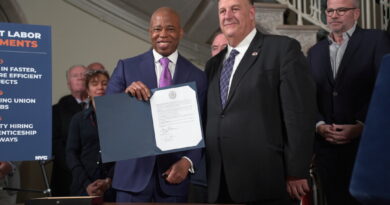The Far-Reaching Implications of the Hunter Biden Pardon
“There’s an established practice regarding the timing of when pardons should be granted… and presidents have the authority to use this power for both justifiable and questionable reasons,” Malcolm commented.
This development occurred despite the president’s earlier commitment not to use his pardoning power in regard to his son.
“I am confident I will not intervene. I promised to respect the jury’s decision … and I will not grant him a pardon,” the president remarked at that moment.
In the meantime, unexpected developments surfaced in the presidential election landscape. President Biden withdrew from the race in late July, allowing Vice President Kamala Harris to take his place, who eventually lost to President-elect Donald Trump.
Trump is anticipated to form a new team at the Department of Justice (DOJ) once inaugurated.
“Clearly, Joe Biden is worried that the Trump administration’s Department of Justice will pursue his son aggressively. That likely influenced their decision,” former federal prosecutor Neama Rahmani commented to The Epoch Times.
Blanket Pardons
Legal experts informed The Epoch Times that Hunter Biden’s pardon is not only extensive but also largely unprecedented in the context of presidential pardons. The only similar instance appears to be President Gerald Ford’s blanket pardon of former President Richard Nixon.
“With Nixon and the Watergate scandal, there was clarity about the potential range of charges,” Rahmani noted.
“There’s an established protocol regarding the issuance of pardons, but it remains a plenary power, and presidents can choose to wield it for both valid and invalid reasons,” John Malcolm, former deputy assistant attorney general for the DOJ’s criminal division, stated to The Epoch Times.
Malcolm, who also serves as the vice president of the Heritage Foundation’s Institute for Constitutional Government, highlighted that the Nixon pardon was extensive, covering any federal crimes he could have committed while in office between January 20, 1969, and August 9, 1974.
“It was a broad time frame and an inclusive pardon. That’s how [Hunter’s] pardon stands out as well, and I’m not aware of any other pardon that mirrors this. Typically, pardons focus on specific federal offenses,” Malcolm explained. “They are usually crime-specific.”
While there are various instances of presidential pardons, some are particular and others more general.
For instance, President Thomas Jefferson pardoned individuals convicted under the Alien and Sedition Act during John Adams’ presidency, deeming the law unconstitutional and its subsequent prosecutions “categorically unfair,” Malcolm noted.
“Pardons are typically granted to individuals due to an unfair trial process … or a belief that the law itself is unjust, or sometimes because the offenses were minor and the individuals have since demonstrated exemplary behavior,” Malcolm remarked.
Some pardons have drawn controversy, such as President Bill Clinton’s criticized pardon of fugitive Marc Rich, which even elicited criticism from Carter.
Clinton also pardoned his half-brother Roger Clinton, who faced drug-related charges.
This situation mirrors the rationale behind some pardons issued by Trump to political allies during his first term, where he claimed those individuals were victims of unjust prosecution, Rahmani stated.
“Donald Trump opened that door, and Joe Biden walked right through it,” Rahmani remarked.
“While I have faith in the justice system, I have also come to realize that raw politics has tainted this process,” Biden expressed.
The timing of the pardon holds significance, as noted by lawyer and legal analyst John Shu, who served during both Bush administrations. He stated to The Epoch Times that President Biden chose to issue the pardon prior to Hunter’s sentencing hearings concerning his gun and tax cases.
If the president had delayed the pardon until after the hearings, a felony record could have jeopardized Hunter Biden’s legal career. Additionally, gun ownership and voting rights may also be impacted based on one’s state of residence.
Although Trump cannot rescind the pardon while in office, nor can his Justice Department reopen criminal investigations into Hunter Biden based on offenses during the time frame specified in the pardon, future legal scrutiny remains possible, Malcolm noted.
Both the Justice Department or Congress could issue a subpoena summoning Hunter Biden before a grand jury, since his acceptance of a blanket pardon means he can no longer rely on the Fifth Amendment right against self-incrimination for federal charges, though it still may apply to state charges or offenses outside the time frame covered by the pardon.
Lawmakers or prosecutors could inquire about Hunter Biden’s conduct as well as that of his family members, including his father and uncle, Malcolm stated.
If Hunter Biden opts not to answer the inquiries, Congress or the DOJ could find him in civil contempt.
“I’m not suggesting the Trump administration will pursue this, or should pursue this, but it is within their authority,” Malcolm concluded.
There is precedent for this type of action, as per Shu’s commentary. When Steve Bannon and Peter Navarro, both officials from the Trump administration, were subpoenaed by Congress during its investigation into the events of January 6, 2021, they were charged with contempt of Congress for their noncompliance. Both have faced jail time this year due to these charges.




